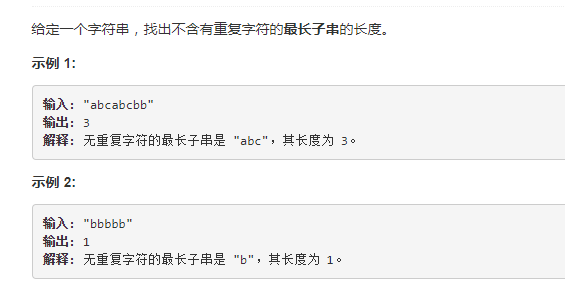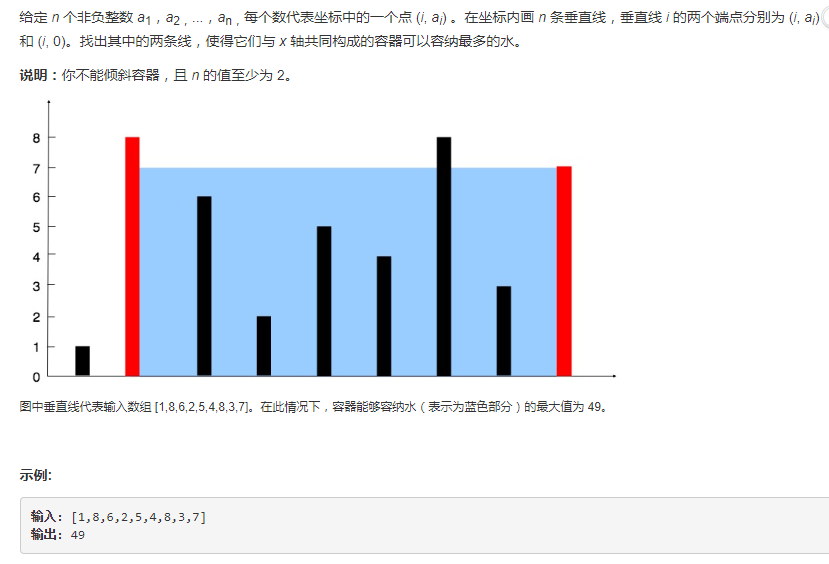1、无重复最长子字符串
题目:

解法:
class Solution: def lengthOfLongestSubstring(self, s): """ :type s: str :rtype: int """ if s=='':return 0 dic = {} i,j = 0,0 max = 0 while j < len(s) : if s[j] in dic and dic[s[j]]>=i: if max<= j-i:max = j-i if j==len(s)-1:return max i = dic[s[j]] +1 dic[s[j]] = j j += 1 if j == len(s) : return max if max>j-i else j-i
2、盛最多水的容器

解法:
class Solution: def maxArea(self, height): """ :type height: List[int] :rtype: int """ left = 0 right = len(height)-1 maxarea = 0 while right>left: if height[left]<height[right]: area = height[left]*(right-left) left +=1 else: area = height[right] * (right - left) right-=1 if area >maxarea: maxarea = area return maxarea
3、三数之和
对于寻找两个数的和,我们通常采用首尾双指针的处理方法,即对于排序后的数组(升序)而言,分别从头尾向中间靠拢,当头尾指针对应元素之和大于目标值时,我们需要缩小元素和,即尾指针前移。当元素之和小于目标值时,我们需要增大元素和,即头指针后移。当头尾指针相遇时,程序终止。
而这道题三个数之和,也可以采用相同的思想,先”固定”第一个数,从后面的子数组中找另外两个数的和。也就是说我们只要在找两数和的前提下,外层嵌套一层遍历第一个数的循环就可以了。
当然,也需要处理重复元素的问题。
解法:
def f(nums): dic = {} ret = [] for i in nums: if i in dic: dic[i]+=1 else: dic[i]=1 if 0 in dic and dic[0]>=3:ret.append([0,0,0]) for i in dic: if dic[i]>=2 and i!=0: if 0-2*i in dic: ret.append([i,i,0-2*i]) ls = sorted(list(dic)) length = len(ls) for i in range(length): head = i+1 tail = length-1 while head<tail: result = ls[head]+ls[tail] if result==-ls[i]: ret.append([ls[i],ls[head],ls[tail]]) head+=1 tail-=1 elif result<-ls[i]: head+=1 else: tail-=1 return ret
大神解法:
class Solution: def threeSum(self, nums): """ :type nums: List[int] :rtype: List[List[int]] """ import collections d = collections.Counter(nums) nums_keys = d.keys() pos, neg = [],[] for p in nums_keys: if p >= 0: pos.append(p) else: neg.append(p) r = [] if d.get(0,0) > 2: r.append([0,0,0]) for i in neg: for j in pos: tar = - i - j if tar in nums_keys: if i< tar < j: r.append([i,tar,j]) elif (j==tar or i == tar) and d[tar]>1: r.append([i,tar,j]) return r